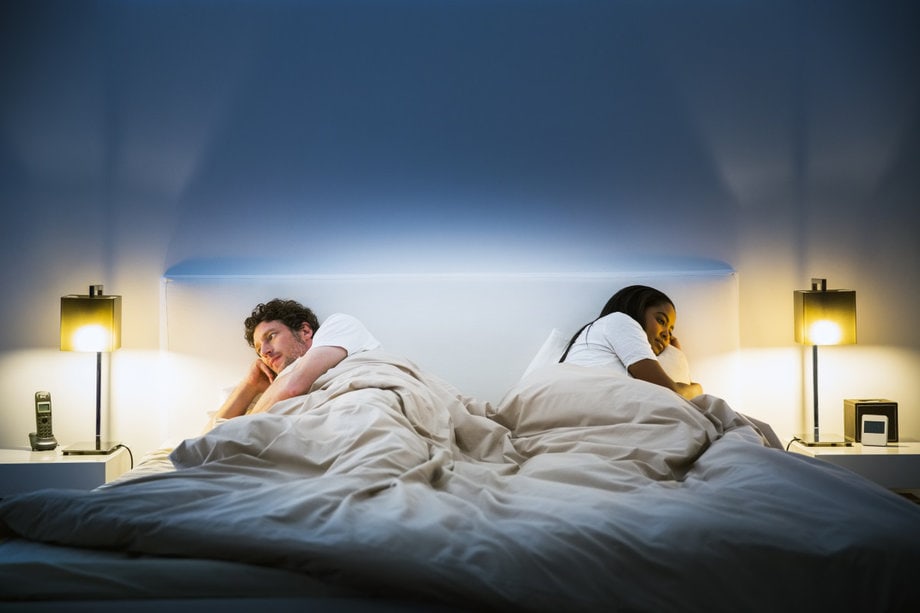Can Sleep Quality Affect Sexual Performance?

Do you ever wonder if your sleep quality could be affecting your sexual performance? It may seem like an unlikely connection, but research suggests that there is a strong link between the two.
When you don’t get enough restful sleep, it can disrupt the delicate balance of hormones in your body, which can have a significant impact on your libido and sexual function. Sleep disorders, such as insomnia or sleep apnea, can also contribute to sexual dysfunction.
On the other hand, getting enough restful sleep has been shown to improve sexual satisfaction and stamina. Additionally, emotional connection plays a crucial role in both sleep and sexual experiences.
By prioritizing good sleep hygiene practices and seeking professional help when needed, you can potentially enhance both your sleep quality and sexual performance. So next time you hit the sack, remember that a good night’s sleep might just lead to better times in the bedroom too!
Key Takeaways
- Sleep deprivation decreases libido and sexual desire.
- Good sleep hygiene improves sexual performance.
- Sleep regulates hormones like testosterone, impacting sexual desire and performance.
- Seeking professional help improves sleep quality and sexual performance.
The Link Between Sleep and Hormonal Balance
Lack of quality sleep can throw off the delicate hormonal balance in your body, leaving your sexual performance feeling as dim and lackluster as a moonless night. When you don’t get enough sleep, your body produces less testosterone, the hormone responsible for libido and sexual function.
Additionally, insufficient sleep can lead to imbalances in other hormones like cortisol, which can negatively impact your sex drive. Not only does poor sleep affect hormone levels, but it also affects energy levels and mood. When you’re tired, you’re less likely to have the energy and desire for intimacy.
Lack of quality sleep can also contribute to stress and anxiety, further diminishing sexual performance. So if you want to keep things hot in the bedroom, prioritize getting a good night’s rest.
Sleep and Libido
If you’ve been feeling a decrease in your sexual desire lately, it might be worth exploring the connection between sleep and libido. Lack of sleep can have a significant impact on your sex drive, causing a decrease in sexual desire.
When you don’t get enough restful sleep, your body’s hormonal balance is disrupted, leading to lower levels of testosterone and an overall decrease in sexual motivation.
The connection between sleep and sex drive
Improve your sleep quality and watch your sex drive soar! The connection between sleep and sex drive is undeniable.
When you don’t get enough sleep, it can negatively impact your libido. Research has shown that poor sleep quality can lead to decreased sexual desire and arousal in both men and women. Lack of sleep affects hormone production, including testosterone, which plays a crucial role in sexual function.
Additionally, inadequate rest can leave you feeling tired and irritable, making it difficult to feel in the mood for intimacy. On the other hand, getting sufficient high-quality sleep promotes hormonal balance and rejuvenates your body, boosting your sex drive naturally.
So if you want to enhance your sexual performance, prioritize improving your sleep habits for a more satisfying experience in the bedroom.
How lack of sleep can decrease sexual desire
Insufficient sleep can dampen your desire for intimacy, leaving you feeling less connected and passionate. When you don’t get enough rest, it can have a significant impact on your sexual desire.
Here are five ways that lack of sleep can decrease your sexual drive:
- Hormonal imbalance: Sleep deprivation disrupts the delicate balance of hormones in your body, including those responsible for regulating sexual desire.
- Increased stress levels: Lack of sleep can lead to higher levels of stress, which can negatively affect both your mood and libido.
- Fatigue and low energy: Feeling tired all the time can make it difficult to find the motivation and energy for sexual activity.
- Decreased focus and concentration: Sleep deprivation impairs cognitive function, making it harder to stay present during intimate moments.
- Weakened immune system: Poor sleep weakens your immune system, increasing the likelihood of illness or other health issues that may interfere with sexual performance.
Taking steps to prioritize good quality sleep is essential for maintaining a healthy sex life.
Sleep Disorders and Sexual Dysfunction
Don’t let sleep disorders ruin your sexual satisfaction. Sleep disorders can have a significant impact on your sexual function and overall intimacy.
Conditions like insomnia, sleep apnea, and restless leg syndrome can disrupt the quality of your sleep, leading to fatigue and decreased libido. Insomnia, in particular, can make you feel constantly tired and irritable, making it difficult to engage in sexual activities with enthusiasm.
Sleep apnea interrupts breathing during sleep, causing frequent awakenings that leave you feeling exhausted and uninterested in sex. Restless leg syndrome creates uncomfortable sensations in your legs, making it hard to fall asleep or stay asleep throughout the night. These disruptions in sleep can result in diminished sexual desire and performance.
Addressing sleep disorders is crucial for maintaining a healthy sex life and overall well-being.
Restful Sleep and Sexual Satisfaction
If you want to improve your sexual satisfaction, one key factor to consider is the quality of your sleep. Quality sleep can contribute to better sexual performance and overall satisfaction. When you’re well-rested, your body and mind are more relaxed, which can enhance your ability to experience pleasure and intimacy with your partner.
How quality sleep improves sexual satisfaction
Get ready to experience enhanced sexual satisfaction by prioritizing quality sleep. Quality sleep has been shown to have a positive impact on sexual performance and satisfaction. When you get enough restful sleep, your body is better equipped to function properly, including in the bedroom. Lack of sleep can lead to fatigue, decreased libido, and difficulty achieving orgasm. On the other hand, quality sleep can increase energy levels, boost mood, and improve overall well-being, all of which contribute to a more satisfying sexual experience.
To further understand the connection between sleep and sexual satisfaction, consider the following table:
| Sleep Quality | Sexual Performance | Sexual Satisfaction |
|---|---|---|
| High | Improved | Increased |
| Moderate | Slightly improved | Maintained |
| Low | Impaired | Decreased |
As you can see from the table above, prioritizing high-quality sleep can significantly enhance both sexual performance and satisfaction. So make sure to establish healthy sleep habits for a more fulfilling sex life.
The role of relaxation in sexual performance
Take a moment to unwind and embrace relaxation, as it plays a crucial role in enhancing your performance between the sheets. When you’re stressed or anxious, your body releases cortisol, which can negatively impact your sexual function.
On the other hand, when you’re relaxed, your body produces oxytocin and endorphins, which promote feelings of pleasure and intimacy. By prioritizing relaxation before engaging in sexual activity, you can improve blood flow to the genital area and increase sensitivity.
Additionally, being relaxed allows for better communication with your partner, leading to enhanced emotional connection and overall satisfaction. So next time you want to enhance your sexual performance, remember the importance of taking the time to relax and create an environment that promotes a sense of calmness and tranquility.
Sleep and Sexual Stamina
Improve your sexual stamina by prioritizing quality sleep. Getting enough sleep is crucial for maintaining a healthy sex life and enhancing your performance in the bedroom. Lack of sleep can lead to fatigue, decreased energy levels, and difficulty concentrating, all of which can negatively impact your sexual stamina.
When you’re well-rested, you have more physical and mental energy to engage in sexual activities and sustain them for longer periods. Sleep also plays a vital role in hormone regulation, including testosterone production, which is essential for sexual desire and performance. Additionally, quality sleep improves blood flow throughout the body, including to the genitals, promoting better arousal and stronger erections.
So make sure you prioritize getting enough restful sleep if you want to boost your sexual stamina.
Emotional Connection and Sleep
Lack of sleep can have a significant impact on your emotional intimacy with your partner. When you’re sleep deprived, it becomes harder to connect emotionally and understand each other’s needs.
Additionally, the lack of sleep can affect relationship dynamics by increasing irritability and decreasing patience, leading to more conflicts and misunderstandings.
The impact of sleep deprivation on emotional intimacy
Sleep deprivation can have a detrimental effect on emotional intimacy, potentially impacting the level of connection and trust between partners.
When you don’t get enough sleep, it can lead to irritability, mood swings, and decreased empathy, making it harder to connect with your partner on an emotional level.
Sleep deprivation also affects cognitive function, making it difficult to communicate effectively and understand each other’s needs. This can create misunderstandings and conflicts that further strain the emotional bond between partners.
Additionally, sleep deprivation can decrease libido and sexual desire, which can further impact sexual intimacy.
To maintain a strong emotional connection with your partner, it’s important to prioritize good sleep hygiene and ensure you both get enough restorative sleep.
How lack of sleep can affect relationship dynamics
To maintain a strong and fulfilling relationship, it is essential that you prioritize taking care of your physical and mental well-being. Lack of sleep can have a significant impact on your relationship dynamics. When you are sleep-deprived, you may find yourself feeling irritable, moody, and lacking the energy to engage in meaningful conversations or activities with your partner. Sleep deprivation can also lead to decreased empathy and understanding towards each other’s needs and emotions. It becomes difficult to communicate effectively and resolve conflicts in a constructive manner when both partners are exhausted. Additionally, lack of sleep can affect your libido, making it harder to feel sexually connected with your partner. Therefore, it is crucial to establish healthy sleep habits and ensure that you both get enough rest for the sake of maintaining a harmonious relationship.
| Negative Effects of Lack of Sleep on Relationship Dynamics | |
|---|---|
| Irritability | Decreased empathy |
| Moodiness | Difficulty communicating |
| Lack of energy | Decreased libido |
| Ineffective conflict resolution |
Sleep Hygiene and Sexual Performance
If you want to enhance your sexual performance, improving your sleep quality is key. By practicing good sleep hygiene, you can optimize your rest and recharge your energy levels, leading to better overall performance in the bedroom.
Some tips for achieving better sleep include maintaining a consistent sleep schedule, creating a relaxing bedtime routine, and ensuring your sleeping environment is comfortable and conducive to restful sleep.
Tips for improving sleep quality
By implementing some simple changes into your nightly routine, you can significantly enhance the quality of your sleep and ultimately improve your overall sexual performance.
Here are a few tips to help you achieve better sleep. First, establish a consistent bedtime routine that includes relaxing activities like reading or taking a warm bath. Avoid electronic devices before bed as the blue light can disrupt your sleep cycle.
Create a comfortable sleep environment by keeping your bedroom cool, quiet, and dark. Invest in a supportive mattress and pillows that suit your preferences.
Limit caffeine and alcohol intake, especially close to bedtime, as they can interfere with deep sleep.
Finally, try to manage stress through techniques such as meditation or deep breathing exercises. By improving your sleep quality, you’ll likely notice positive effects on both your energy levels and sexual performance.
How good sleep habits can enhance sexual performance
Now that you’ve learned some helpful tips for improving your sleep quality, let’s dive into how good sleep habits can enhance your sexual performance.
Getting enough high-quality sleep is crucial for maintaining a healthy sex life. When you prioritize restful nights, it can lead to increased energy levels, better mood, and improved overall well-being – all of which contribute to a satisfying experience in the bedroom.
Quality sleep also plays a vital role in regulating hormones like testosterone, which is directly linked to sexual desire and performance. Additionally, when you’re well-rested, you’re more likely to have better focus and concentration, allowing you to fully engage in intimate moments with your partner.
So make sure to establish a consistent bedtime routine and create an optimal sleeping environment to reap the benefits of both restful slumber and fulfilling intimacy.
Seeking Professional Help
Seeking professional help is a wise choice for individuals looking to improve their sleep quality and subsequently enhance their sexual performance. A trained sleep specialist can assess your specific sleep issues and develop a personalized treatment plan. Here are three reasons why seeking professional help can be beneficial:
- Expert guidance: Sleep specialists have extensive knowledge and expertise in diagnosing and treating sleep disorders. They can provide you with evidence-based strategies to optimize your sleep quality, leading to improved sexual performance.
- Tailored solutions: Every individual’s sleep needs are unique. A sleep specialist will evaluate your lifestyle, medical history, and sleeping patterns to create a customized plan that addresses the root causes of your sleep problems. By addressing these underlying issues, you can overcome any barriers affecting your sexual performance.
- Emotional support: Sleep disturbances can be emotionally draining and impact various aspects of life, including relationships and intimacy. Seeking professional help ensures you receive the necessary emotional support throughout your journey towards better sleep and enhanced sexual performance.
Remember, taking the step to seek professional assistance is an investment in both your physical and emotional well-being, ultimately improving your overall quality of life.
Frequently Asked Questions
What are some common sleep disorders that can potentially contribute to sexual dysfunction?
Some common sleep disorders that can potentially contribute to sexual dysfunction include insomnia, sleep apnea, and restless leg syndrome. These conditions can disrupt your sleep patterns and lead to problems with arousal, libido, and overall sexual performance.
How does the quality of sleep affect hormonal balance and subsequently impact sexual performance?
The quality of sleep directly affects hormonal balance and can subsequently impact sexual performance. Hormonal imbalances due to poor sleep can lead to decreased libido, erectile dysfunction, and other sexual problems.
Are there any specific sleep hygiene practices that can help improve sexual satisfaction?
To improve sexual satisfaction, try practicing good sleep hygiene. This includes establishing a consistent sleep schedule, creating a comfortable sleep environment, avoiding stimulants before bed, and reducing stress levels.
Can emotional connection with a partner be influenced by sleep quality, and if so, how?
Sleep quality can greatly impact your emotional connection with a partner. When you don’t get enough sleep, it can affect your mood, energy levels, and ability to connect with your partner on an emotional level.
If sleep-related issues are consistently affecting your sexual performance and it is causing distress or impacting your relationship, it may be time to consider seeking professional help for a comprehensive evaluation and treatment options.









